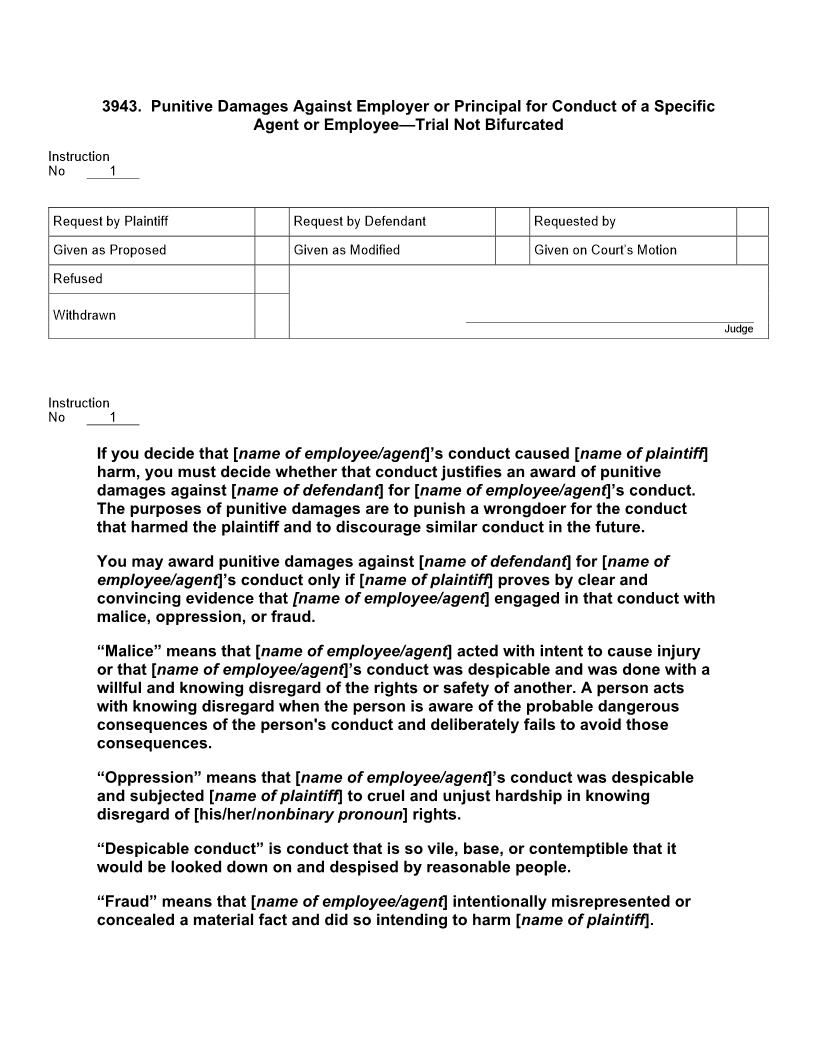
Last updated: 10/14/2020
3943. Punitive Damages Against Employer Or Princ. Agt Or Employee Cond. Not Bifurcated
Start Your Free Trial $ 17.99What you get:
- Instant access to fillable Microsoft Word or PDF forms.
- Minimize the risk of using outdated forms and eliminate rejected fillings.
- Largest forms database in the USA with more than 80,000 federal, state and agency forms.
- Download, edit, auto-fill multiple forms at once in MS Word using our Forms Workflow Ribbon
- Trusted by 1,000s of Attorneys and Legal Professionals
Description
3943. Punitive Damages Against Employer or Principal for Conduct of a Specific Agent or Employee--Trial Not Bifurcated Instruction No 1 Request by Plaintiff Given as Proposed Refused Withdrawn Request by Defendant Given as Modified Requested by Given on Court's Motion Judge Instruction No 1 If you decide that [name of employee/agent]'s conduct caused [name of plaintiff] harm, you must decide whether that conduct justifies an award of punitive damages against [name of defendant] for [name of employee/agent]'s conduct. The purposes of punitive damages are to punish a wrongdoer for the conduct that harmed the plaintiff and to discourage similar conduct in the future. You may award punitive damages against [name of defendant] for [name of employee/agent]'s conduct only if [name of plaintiff] proves by clear and convincing evidence that [name of employee/agent] engaged in that conduct with malice, oppression, or fraud. "Malice" means that [name of employee/agent] acted with intent to cause injury or that [name of employee/agent]'s conduct was despicable and was done with a willful and knowing disregard of the rights or safety of another. A person acts with knowing disregard when he or she is aware of the probable dangerous consequences of his or her conduct and deliberately fails to avoid those consequences. "Oppression" means that [name of employee/agent]'s conduct was despicable and subjected [name of plaintiff] to cruel and unjust hardship in knowing disregard of [his/her] rights. "Despicable conduct" is conduct that is so vile, base, or contemptible that it would be looked down on and despised by reasonable people. "Fraud" means that [name of employee/agent] intentionally misrepresented or concealed a material fact and did so intending to harm [name of plaintiff]. 3943. Punitive Damages Against Employer or Principal for Conduct of a Specific Agent or Employee--Trial Not Bifurcated Instruction No 1 Request by Plaintiff Given as Proposed Refused Withdrawn Request by Defendant Given as Modified Requested by Given on Court's Motion Judge Instruction No 1 [Name of plaintiff] must also prove [one of] the following by clear and convincing evidence: 1. [That [name of employee/agent] was an officer, a director, or a managing agent of [name of defendant], who was acting on behalf of [name of defendant]; [or]] [That an officer, a director, or a managing agent of [name of defendant] had advance knowledge of the unfitness of [name of employee/agent] and employed [him/her] with a knowing disregard of the rights or safety of others; [or]] [That an officer, a director, or a managing agent of [name of defendant] authorized [name of employee/agent]'s conduct; [or]] [That an officer, a director, or a managing agent of [name of defendant] knew of [name of employee/agent]'s wrongful conduct and adopted or approved the conduct after it occurred.] An employee is a "managing agent" if he or she exercises substantial independent authority and judgment in his or her corporate decisionmaking such that his or her decisions ultimately determine corporate policy. 2. 3. 4. There is no fixed formula for determining the amount of punitive damages, and you are not required to award any punitive damages. If you decide to award punitive damages, you should consider all of the following factors in determining the amount: (a) How reprehensible was [name of defendant]'s conduct? In deciding how 3943. Punitive Damages Against Employer or Principal for Conduct of a Specific Agent or Employee--Trial Not Bifurcated Instruction No 1 Request by Plaintiff Given as Proposed Refused Withdrawn Request by Defendant Given as Modified Requested by Given on Court's Motion Judge Instruction No 1 reprehensible [name of defendant]'s conduct was, you may consider, among other factors: 1. 2. 3. Whether the conduct caused physical harm; Whether [name of defendant] disregarded the health or safety of others; Whether [name of plaintiff] was financially weak or vulnerable and [name of defendant] knew [name of plaintiff] was financially weak or vulnerable and took advantage of [him/her/it]; Whether [name of defendant]'s conduct involved a pattern or practice; and Whether [name of defendant] acted with trickery or deceit. 4. 5. (b) Is there a reasonable relationship between the amount of punitive damages and [name of plaintiff]'s harm [or between the amount of punitive damages and potential harm to [name of plaintiff] that [name of defendant] knew was likely to occur because of [his/her/its] conduct]? (c) In view of [name of defendant]'s financial condition, what amount is necessary to punish [him/her/it] and discourage future wrongful conduct? You may not increase the punitive award above an amount that is otherwise appropriate merely because [name of defendant] has substantial financial resources. [Any award you impose may not exceed [name of defendant]'s ability to pay.] 3943. Punitive Damages Against Employer or Principal for Conduct of a Specific Agent or Employee--Trial Not Bifurcated Instruction No 1 Request by Plaintiff Given as Proposed Refused Withdrawn Request by Defendant Given as Modified Requested by Given on Court's Motion Judge Instruction No 1 [Punitive damages may not be used to punish [name of defendant] for the impact of [his/her/its] alleged misconduct on persons other than [name of plaintiff].] ________________________________________________________________________________ New September 2003; Revised April 2004, October 2004, December 2005, June 2006, April 2007, August 2007, October 2008







